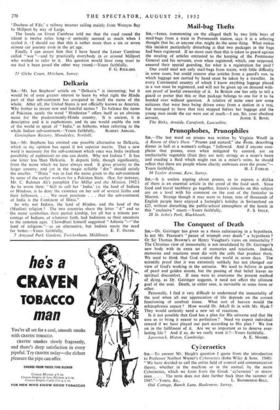The Conquest of Death
Srit,—Dr. Geiringer has given us a thesis culminating in a hypothesis. Is not Mr. Pearson's " paean of triumph over death " a hypothesis ? Or Sir Thomas Browne's or Henry Vaughan's views on immortality ? The Christian view of immortality is not invalidated by Dr. Geiringer's new body with its extra set of memories and reactions. Indeed, memories and reactions must die with the cells that produce them. We used to think that God created the world in seven days. Tho scientific proof that it was extremely unlikely has not changed our view of God's working in the universe. We used to believe in gates of pearl and golden streets, but the passing of that belief leaves no spiritual discomfort. If men were to overcome the present method of dying, as Dr. Geiringer suggests, it need not affect the ultimate goal of the soul. Death, in either case, is inevitable in some form or other.
Personally, I find it very difficult to understand the immortality of the soul when all our appreciation of life depends on the correct functioning of cerebral tissue. What sort of heaven would the schizophrenic expect ? How would Dr. Jekyll fit in with Mr. Hyde ? They would certainly need a new set of reactions.
Is it not possible that God has a plan for His universe and that He uses us to bring it nearer to perfection ? Need we expect individual reward if we have played our part according to His plan ? We live on in the fulfilment of it. Are we so important as to deserve ever- lasting life ? And if so, do we really want it ?—Yours faithfully,


































 Previous page
Previous page